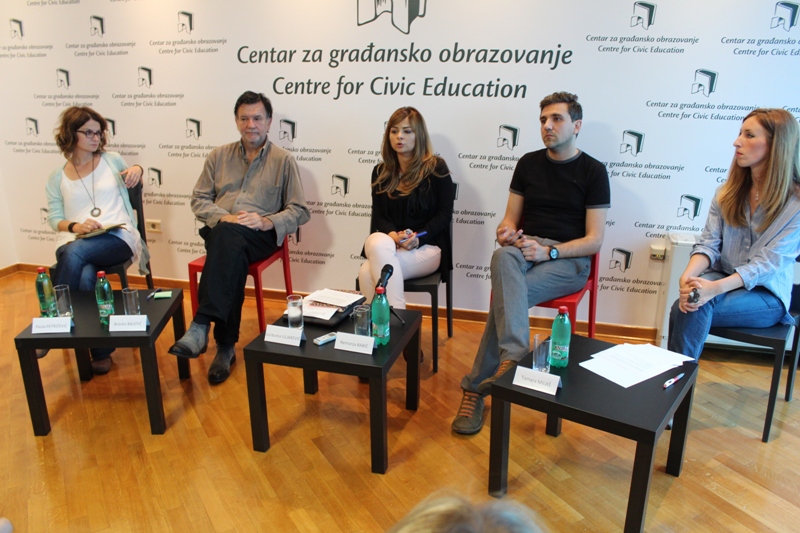On the occasion of World Peace Day, Centre for Civic Education (CCE) and Coalition for REKOM today organised third consecutive debate on reconciliation, on the subject: Can art contribute to the process of reconciliation in region?
Debate on reconciliation was opened by Montenegrin premiere of documentary “The unidentified”, by Nemanja Babić and Marija Ristić, which also announced the VII edition of FAST FORWARD Human Rights Film Festival 2016.
Daliborka ULJAREVIĆ, executive director of Centre for Civic Education (CCE), reminded that, on the occasion of International Day of Peace September 21, CCE and Coalition for REKOM stress that governments in post-Yugoslav states are obliged to ensure peace without the fear of new wars and reoccurrence of war crimes, as well as to establish good neighbourly relations on the foundations of respect for the facts and personal dignity of victims. “The lack of interest by our artistic scene is incomprehensible, and its incapability to realise something so potent for the artistic creativity on the subject of reconciliation which is right there in our own backyards”, Uljarević stated, thereby assessing that Montenegrin culture could, and should contribute to process of reconciliation, and align with what is being done in the region, as well as in other states of Europe which pay more and more attention to this matter and this form.
Branko BALETIĆ, film director, underlined that art could significantly contribute to process of reconciliation in region and added that political will is crucial for that part. He recalled of his own experience in the creation of artistic content in relation to the reconciliation in region, thereby emphasising that there are contents in Croatia, Bosnia and Herzegovina which provide a critical review on post-war events. “My pessimism on reconciliation relies on the fact that same people who ruled these states during the disintegration of SFRY, rule today, or at least their inheritors do.” He concluded by saying that key responsibility for this process lies in competitive bodies that should establish the facts and process the ones who are responsible.
Nemanja BABIĆ, director of film “The unidentified”, spoke about the experience of working on this and similar projects in last 15 years, as well as about the post-war developments on the territory of former Yugoslavia. He divided post-war art in two: one, which assumed the role of policy of eighties which incited nationalism under the guise of revival and up-rise of national identity, and other, which unlike the first one, sought to compel the individuals to take their own stand, thereby emphasising that such form of art was often pushed to the side and marked as underground. Babić underlined that “art cannot affect the course of political events, however, it does have the power the change people’s opinion during the course of time, to help them find the meaning of life during most arduous moments and connect people in general.”
Paula PETRIČEVIĆ, philosopher and executive director of NGO Inkubator, estimated that reconciliation is unlikely to happen “on the territory where bodies were swept under the rug”. She agreed that Montenegro lacks the artists who would be willing to tackle these topics because “they isolate and lead to danger and we specialised in acting only as minions”. By commenting the manner in which art causes change in individuals and community, she stated that “art is always in dialogue, as critic and provocation and such is the way to bring change in canon and in society in general.”
Opening remarks of panelists were followed by the debate of audience, among whom there were representatives of institutions, NGO sector, political parties and of course the artistic community.
This third debate aimed to stimulate artistic engagement, as a form of social responsibility towards the process of establishment of truth about the victims, which is essential for reconciliation and sustainable development of region.
RECOM Initiative gathers numerous civil society organisations and individuals from region advocating for foundation of Regional commission for the establishment of facts about war crimes and other serious violations of human rights committed in the former Yugoslavia from 1 January 1991 until 31 December 2001. As a referent organisation of Coalition for RECOM, CCE tends to contribute in the efficiency of that process with its activities.
Debate Can art contribute to process of reconciliation in region? was organised within the project Strengthening the process of REKOM (stage II), supported by the European Union, French Catholic Committee against hunger and for development and Rockefeller Brothers Fund.
Svetlana Pešić, programme associate

